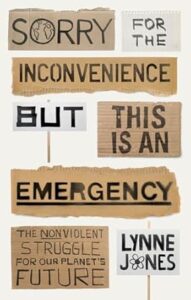 At its heart this book is a call to make the world a fairer place and to recognise our power, not only as citizens but also as doctors. As a psychiatrist, author Lynne Jones clearly recognises that we identify most with personal encounters and so, alongside many references, statistics and philosophical analyses, the warmth of her book comes from her compelling approach to storytelling, a skill central to leadership and movement building.
At its heart this book is a call to make the world a fairer place and to recognise our power, not only as citizens but also as doctors. As a psychiatrist, author Lynne Jones clearly recognises that we identify most with personal encounters and so, alongside many references, statistics and philosophical analyses, the warmth of her book comes from her compelling approach to storytelling, a skill central to leadership and movement building.
As a respected doctor and aid worker she offers a courageous and convincing account of actions needed to tackle social injustices, focussing predominantly on climate change and nuclear weapons, for which she has tirelessly protested against. Interestingly, Jones shares with the reader that she has never been a joiner, preferring to run in the opposite direction when asked to belong to a group. At the same time, her professional responsibility as a doctor is clearly important to her as it would be for most doctors. Doctors often see themselves as good citizens, wanting to stand up for what’s right but may be reluctant to challenge social taboos or to ever break the law. Yet her book is aimed at encouraging those of us who identify with these characteristics to contemplate a different way of being.
Each chapter is prefaced by a snapshot of a particular moment, many drawn from the 1980’s and her time on Greenham Common protesting against nuclear weapons. These vivid preambles remind us of how messy and complicated life is: being a Greenham Common woman at the time involved being widely ridiculed, feeling uncertain about aims and tactics, and living with dirt, discomfort and heavy-handed legal sanctions; a concept that may resonate with those that engage in climate activism today. The Greenham Common protests are now known to have contributed to the scaling down of nuclear weapons, with the site of the protests having been redeveloped as a peace garden in its honour. Using this historical perspective, Jones encourages us not to give in to the hopelessness that is all too easy to feel when considering the chasm between the actions needed to tackle the challenge of climate change and those being implemented by political leaders.
She reminds us of the injustice that underpins the climate crisis; the people across the world who have done the least to bring about global warming are also the most vulnerable to its effects. She uses her own experiences of protesting in Greenham Common to make the point that unpopularity is not a measure of ineffectiveness of tactics and devotes pages exploring legal and powerful methods of social change.
However, Jones does not shy away from being a proponent of nonviolent direct action and as such the book offers a deep dive into the activism, both lawful and what may be deemed as unlawful, that may be required to create lasting social change. Questions explored include; What do we mean by nonviolent direct action? Is it effective – and what factors make it more or less so? What right do activists have to disrupt others in order to draw attention to their cause? Notably, these questions have become increasingly pertinent over recent months.
Whilst Jones’s commitment to justice shines through the entirety of the book, she manages to articulate this in a way that cannot be interpreted as preachy, but instead in a way that simply reminds us to find our shared humanity.
The book closes with a call to action for us all; that we should all use our voices and our platforms, to engage in activism, and to communicate the urgency and injustices around us. A few short months after the publication of this book, the British Medical Association passed a motion at the Annual General Meeting in June 2024 on ‘safeguarding the rights of healthcare workers and medical students engaged in activism’, believing that ‘such participation is fundamental to health equity and reducing inequalities’. This represents a significant moment in the profession; in terms of the recognition of the role of medics as activists.
As such, it is likely that many will find Jones’s book supportive and hopeful; a guiding light to help them think through what it means to be both a doctor and an activist. Her inspiring story from medical student to doctor, activist and international campaigner offers hope and clarity on what it really means to lead for a better, fairer and healthier world.
Reviewer biography:
Dr Geraldine Swift is a consultant in liaison psychiatry and director of medical education in North West England. She is a member of the committee implementing the NHS Green Plan in her local trust, and also of the Green Network, a staff group looking at sustainability at grassroots level. She supports Just Stop Oil; Extinction Rebellion for Health; and has canvassed for the Greenpeace Climate Vote Campaign.